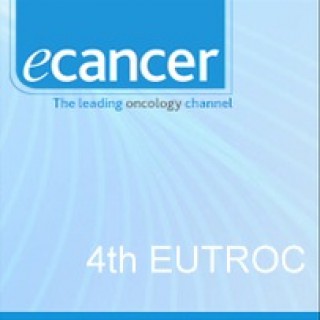
4th EUTROC (European Network for Translational Research in Ovarian Cancer
Follow 4th EUTROC (European Network for Translational Research in Ovarian CancerInterviews and discussion from the 4th EUTROC meeting at the Liverpool Women's Hospital.
- Nov 19, 2012 LATEST EPISODE
- infrequent NEW EPISODES
- 6m AVG DURATION
- 10 EPISODES
More podcasts from ecancer.org
Latest episodes from 4th EUTROC (European Network for Translational Research in Ovarian Cancer

Highlights from the 4th EUTROC meeting: Prof John Green – University of Liverpool, UK
Prof John Green talks to ecancer about the highlights of the 4th EUTROC meeting in Liverpool, including methods of translational research, targeted therapies and the development of bio banks.

Development of clinical trials and bio banks: Prof Hani Gabra – Imperial College London, UK
Prof Hani Gabra discusses the process of collecting data from clinical trials and finds that many only consider a single end point and fail to account for the molecular side of analysis. Prof Gabra suggests that collection of tumour samples during the trials must take place. As ovarian cancer is not the most common kind of cancer, there is a need for collaboration to collect samples and a single operating protocol.

Drug approval process for ovarian cancer: Prof Maria Paolo Costi – University of Modena, Italy
Prof Maria Paolo Costi talks to ecancer at the 4th EUTROC meeting in Liverpool, UK about new drug developments and the main issues surrounding the drug approval process for ovarian cancer. Prof Costi highlights work being done on folate receptors and their role in ovarian cancer; in particular, a project discussed at the meeting on candidate drugs targeting this receptor and the difficulty of advancing these drugs to the clinical stages.

Biology of molecular sub types in ovarian cancer: Prof David Bowtell – Peter MacCallum Cancer Centre, Melbourne, Australia
Prof David Bowtell talks to ecancer at the 4th EUTROC meeting in Liverpool, UK about the mutations in different types of ovarian cancer and the integration of this information to better understand the survival of tumour cells. Understanding molecular subtypes and their biology will allow for the creation of a working framework to categorises the factors of survival for further analysis. Prof Bowtell also discusses a EUTROC trial looking at the p53 mutation and individualising treatment in recurrent disease.

Interplay between pathologies of ovarian cancer and genomics: Prof David Huntsman – University of British Columbia, Canada
Prof Huntsman’s team looks to find direct ways of targeting treatment and a better understanding as to why certain patient’s treatment fails in the most common types of ovarian cancer. His team also looks to better grasp the different tumour subtypes and the clinical implications for each, as well as the heterogeneity of the mutations. Prof Huntsman also highlights the importance of translational research discussed at the 4th EUTROC.

Histological and molecular sub types of ovarian cancer: Dr Jozien Helleman – Erasmus Medical Centre, Rotterdam, Netherlands
Dr Jozien Helleman talks to ecancer at the 4th EUTROC meeting in Liverpool, UK about a study that extensively categorised ovarian tumours. Methods used included sequencing and gene expression, as well as combining this with therapy response. Dr Helleman also discusses the potential for identifying drugable targets through these methods.

Interaction between tumour biology and surgery: Dr Christina Fotopoulou – Charite University Hospital, Berlin, Germany
Dr Christina Fotopoulou talks to ecancer at the 4th EUTROC meeting in Liverpool about surgery in ovarian cancer and various hypothesis as to why patients are being operated on. Dr Fotopoulou notes that in surgery, one theory for recurrence is that resistant clones pre-exist at the outset of the disease. As twenty percent cannot be operated on completely because of tumour structure, other methods like histology and cytokines are being investigated.

Early stage biomarkers in ovarian cancer: Prof Angelo Paradiso – National Cancer Research Institute, Bari, Italy
Prof Angelo Paradiso discusses the process in which exploratory biomarkers move into clinical application. The steps to move a biomarker into the clinic are very complicated, but necessary as it must be guaranteed that these markers work according to a strict quality criteria. Prof Paradiso highlights the two main factors of the criteria as the need for standard operating producers for to clinicians and confirmation of reproducible results in a lab setting.

Sub-typing ovarian cancer: Dr Charles Gourley – University of Edinburgh Cancer Research Center, UK
Previously thought to be one disease, ovarian cancer is now diagnosed as at least five different diseases based on the histology. For predictive biomarkers to work properly they must predict the reaction of drug treatment within these subtypes and not the disease in general. In ovarian cancer, standard first line treat is very often effective, so evidence from biomarkers must be very strong to deviate from this standard. Dr Gourley also discusses the move to a more personalised medicine and variations even in tumours within a single patient.

The Merseyside and Cheshire cancer network: Dr John Kirwan – Liverpool Womens Hospital, UK
Dr John Kirwan talks to ecancer at the 4th EUTROC meeting at the Liverpool Womens Hospital about the local cancer network and highlights from the meeting.

















